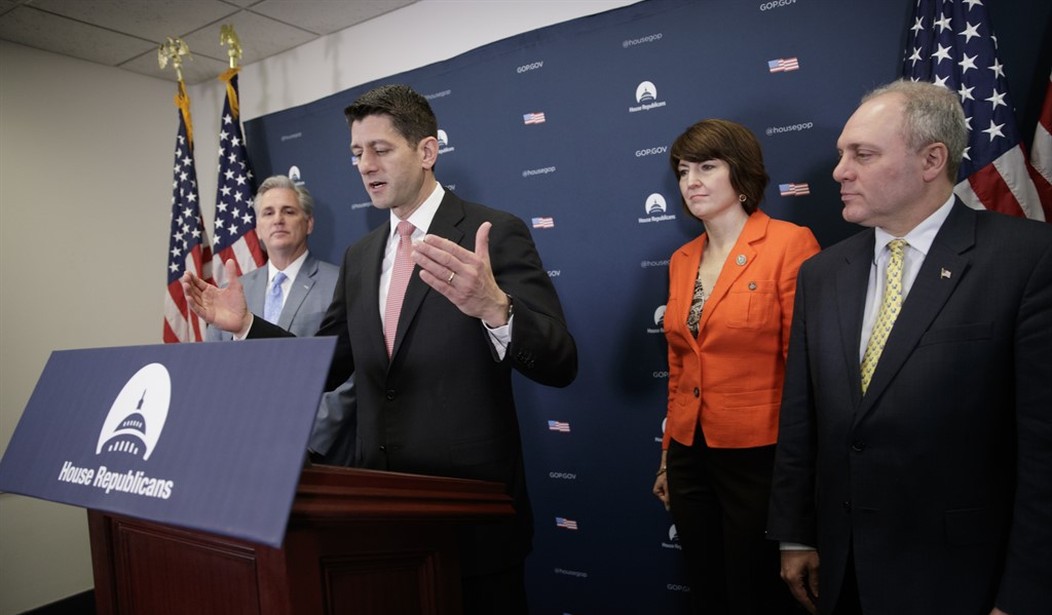Waiting with bated breath for that ObamaCare repeal vote today? Well, you can start breathing normally again, at least for a while. Late last night, House Majority Leader Kevin McCarthy told reporters that Republican leadership has no plans to offer the American Health Care Act (AHCA) up for a vote today — or tomorrow, for that matter:
The House will not vote on a measure to repeal and replace the 2010 health care law Friday or Saturday, House Majority Leader Kevin McCarthy said Thursday.
“We’ve been educating people on health care,” he said. “It’s not tomorrow. I never said it was going to be tomorrow. … We are not voting on health care tomorrow.”
When asked about Saturday, he said, “No. We never put it out there.” He made no further comments about timing.
That decision came after a meeting of House GOP leadership, Roll Call notes, that lasted almost two hours and well into the evening. Erin Mershon and Lindsey McPherson report that the leaders didn’t even agree on the agenda for it afterward; Cathy McMorris Rodgers said it had been primarily about the health-care legislation, but McCarthy said it had been mostly about the continuing resolution to extend the budget talks. “Did I ever say we were going to vote on health care?” McCarthy responded when asked about the topic.
Touchy, touchy. And actually, they did say that … in March. For those wondering why there won’t be a vote today, tomorrow, or any time soon on the AHCA, be sure to read Allahpundit’s post from late yesterday afternoon. As predicted, as soon as concessions got made to bring the House Freedom Caucus on board, moderates began balking, and the votes for passage simply weren’t there. This raises a number of questions about where Paul Ryan and McCarthy go from here. Their caucus appears to be split between those who want full repeal, and those who want to make incremental changes to the status quo, and both are too afraid of their own constituents to shift their positions enough for a compromise.
Byron York has a simpler explanation. Ryan and McCarthy can’t get a repeal passed because too many Republicans don’t want ObamaCare repealed:
About a week after the first Obamacare repeal failure, a House Republican, speaking privately, said the difficulty in passing the bill was not a parliamentary problem involving the complexities of the Senate and reconciliation. No, the lawmaker said, “It is a problem that we have members in the Republican conference that do not want Obamacare repealed, because of their district. That’s the fundamental thing that we’re seeing here.”
“I thought we campaigned on repealing it,” the lawmaker continued. “Now that it’s our turn, I’m finding there’s about 50 people who really don’t want to repeal Obamacare. They want to keep it.”
Other conservatives are saying similar things. In an email exchange Thursday afternoon, I asked one member where the latest bill stood. “We absolutely do not have the votes to repeal it,” he answered. “The fact that some members are balking at even allowing states to waive out of some of Obamacare regulations is proof positive. We’ve gone from ‘repeal it root-and-branch’ to ‘Mother-may-I opt out of some of Obamacare’ — and we still are having trouble getting the votes.”
York’s not sure about the numbers of these Republican keep-ObamaCare caucus. He gets various estimates ranging from the low twenties to the mid-forties, but even the lowest estimate is enough to keep any bill from passing. Some other Republicans have more or less given up on the idea of repealing ObamaCare with one bill or even in one year:
Some Republicans remain optimistic, but in a much longer-term sense. “The process of removing a 2,300-page law with 20,000 pages of rules can’t be done in one vote,” says the member who estimated that 25 to 30 Republicans don’t want to vote for repeal. “The process will take two years.”
They may not have that long. If Republicans don’t deliver on a seven-year promise to repeal ObamaCare with majorities in both chambers and a Republican president, with reconciliation open as a path, then voters might just decide that the GOP is not a viable governing party. In the much longer-term sense, of course.







Join the conversation as a VIP Member